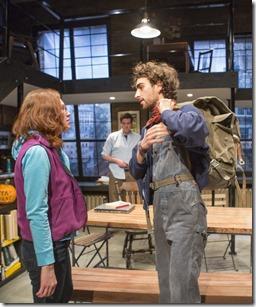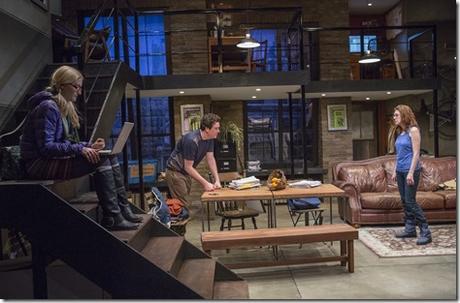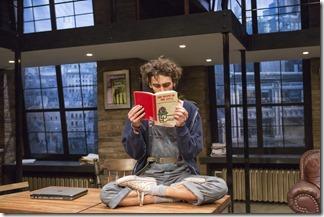
Despite inconsistencies, a production worth seeing

During the heyday of the Occupy Movement, New York City roiled with protesters squatting in public parks, shutting down bridges and demanding - well, what exactly the demands were seemed to depend on who you asked.

With The New Sincerity , playwright Alena Smith zings the shortcomings of "the movement" with the accuracy of a sharpshooter. Part satire and part rom-com, the Theater Wit production directed by Jeremy Wechsler shows highlights the messy contradictions among (ultimately ineffectual) social justice advocates who are clearly based on Occupy Wall Street.
The plot has several groan-worthy improbabilities, chief among them the supposition that a free "literary journal" with no paid staff, subscribers or real distribution system could uproot the very foundations of a capitalistic society. That "Asymptote"is prone to running 10,000-word essays on the likes of the Triangle ShirtwaIst Factory makes its world-changing place in Smith's plot all the more ludicrous. Smith attributes similarly earth-shattering powers to Gawker media. Both suppositions are ridiculous, and in turn, help make Smith's purportedly realistic plot ridiculous.
That plot is set in the office of Asymptote where 30something editor Benjamin (Drew Shirley) manically oversees a publication galvanizing society with its brilliant literary merits. Benjamin is both a misogynist who cheats on his fiancé and and an elitist (his stance on putting pictures in Asymptote is pathetically self-important and wrong-headed). Both traits are ironic given the fact Benjamin's magazine is A) funded by the largesse of an incredibly rich New York City land heir B) Devoted to upending a social order founded on patriarchy. Despite being the head of a magazine he praises for its progressiveness, Benjamin is wholly dismissive of the protestors camping just outside Asymptote's lavishly spacious offices.



Asymptote's star writer is Rose (Maura Kidwell) a doctoral student who acts like she's won the lottery when Benjamin bestows an office key on her and "promotes" her to "contributing writer." In addition to Rose, Asymptote has an intern, Natasha (Erin Long), who has been interning for three years without pay.
Since the magazine is free (and ostensibly distributed by hand by Benjamin, Natasha and Rose), nobody in this New York story actual makes money enough to live in New York (Or anywhere else, for that matter.), That's another massive plot hole in Smith's narrative. Are Rose and Natasha and Benjamin all trust-fund babies? Do they work at Starbucks when they're not on stage? Who in the everloving world would work as an unpaid intern for three years?

But where the plot in The New Sincerity fails, the satire succeeds. Django may be protesting the very rich (and, of course, "the man"), but like the very rich, he's got no problem taking whatever he wants, whenever he wants it. He may be wearing filthy overalls rather than a $5,000 suit, but his guiding principal - basically that whatever he wants, he's entitled to - are right in line with the likes of the Koch Brothers of the world.
When it comes to articulating precisely what "the movement" wants - what its goals are, how it will achieve those goals, how it will measure its outcomes - Django, Rose and Benjamin have nothing to say beyond a few breezy, meaningless references to peace and love. And as a self-styled hobo, Django turns out to be about as sincere as a Halloween costume. In Stein's mellow wide-eyed pseudo-innocence, Django is an immature charmer with a flair for buzz words, but who really doesn't have the faintest idea who he is or what he wants.


Shirley makes Benjamin's similarities with Django shine through, even when the two seem like polar opposites. As Rose, Kidwell does great work with a flawed role, making Rose fiercely ambitious and intelligent. Ironically, it's the strength of those traits that make Rose's relationship with Benjamin and Django feel about as likely as Gawker leading the revolution. It's disappointing that Smith has Rose talk about her passion for writing, but then gives Rose a storyline that centers on the men in her life.
It's intern Natasha who ends up stealing the show. Long is a comedic force, infusing every single scene she's in with quirkiness and humor. She carries a light with her that's glorious. When she's offstage, it's as if things literally become darker.
Set designer Adam Veness' airy loft gives Rose, Natasha, Django and Benjamin a fabulous space to bounce around. Costumier Izumi Inaba deftly clothes the four in ways that emphasize their characters.
All in all, The New Sincerity is one of those plays that teeters between terrific and troubled. Smith does a first-rate job skewering the shortcomings of a movement without a plan, and in idealism that is rooted in hypocrisies the idealists are blind to. But her plot is wholly unlikely and her characters are often inconsistent. If you can overlook the the flaws, you've got a show well worth seeing and one that puts a recent chapter of history in terrific perspective.

The New Sincerity continues through April 17th at Theater Wit, 1229 W. Belmont (map), with performances Thursdays-Saturdays at 8pm, Sundays 2pm. Tickets are $30-36 ($20 for anyone under 30), and are available by phone (773-975-8150) or online through their website (check for half-price tickets at Goldstar.com ). More information at TheaterWit.org. (Running time: 90 minutes, no intermission)
Maura Kidwell (Rose), (Natasha), Drew Shirley (Benjamin), (Django). Nick Bryant, Cory Hardin, Ameila Hefferon, Sarah Sawicki (understudies).
behind the scenes



Jeremy Wechsler (director), Genevieve Fowler (assistant director), Adam Veness (scenic design), Sarah Hughey (lighting design), Izumi Inaba (costume design), Vivian Knouse (properties design), Sarah Putts (sound design), Keaton Wooden (audience design), Adam Lord (assistant audience design), Kristina Vlada-Viars (artistic ambassador), Andrew Glesenhardt (technical design), Kristof Janezic (master electrician), Greg Pisoneault (scenic charge), Majel Cuza (production manager), Katie Klemme (stage manager), Adam Ganzer (assistant stage manager), Claire Cooney (casting), Charles Osgood (photos)
Tags: 16-0320, Adam Ganzer, Adam Lord, Adam Veness, Alena Smith, Alex Stein, Ameila Hefferon, Andrew Glesenhardt, Catey Sullivan, Charles Osgood, Chicago Theater, Claire Cooney, Cory Hardin, Drew Shirley, Erin Long, Genevieve Fowler, Greg Pisoneault, Izumi Inaba, Jeremy Wechsler, Katie Klemme, Keaton Wooden, Kristina Vlada-Viars, Kristof Janezic, Majel Cuza, Maura Kidwell, Nick Bryant, post, Sarah Hughey, Sarah Putts, Sarah Sawicki, Theater Wit, Vivian Knouse

